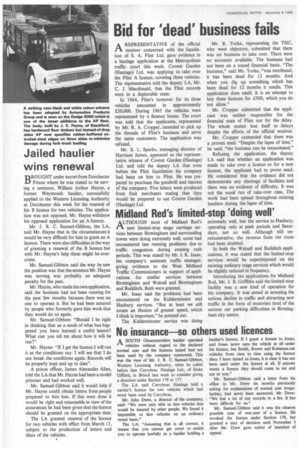Bid for 'dead' business fails
Page 44

If you've noticed an error in this article please click here to report it so we can fix it.
AREPRESENTATIVE of the official receiver concerned with the liquidation of S. A. Flint Ltd. gave evidence in a haulage application at the Metropolitan traffic court this week. Covent Garden (Haulage) Ltd. was applying to take over the Flint A licence, covering three vehicles. The representative told the deputy LA, Mr. C. J. Macdonald, that the Flint records were in a deplorable state.
In 1964, Flint's turnover for its three vehicles amounted to approximately £20,000. During 1965 the vehicles were repossessed by a finance house. The court was told that the applicants, represented by Mr. R. A. Cropper, intended to pick up the threads of Flint's business and serve the same customers. The application was refused.
Mr. S. L. Sparks, managing director of Harrison James, appeared as the representative witness of Covent Garden (Haulage) Ltd. and told the deputy LA that even before the Flint liquidation his company had been on hire to Flint. He was prepared to purchase the goodwill and interest of the company. Five letters were produced from fruit merchants stating that they would be prepared to use Covent Garden (Haulage) Ltd. Mr. R. Yorke, representing the THC, who were objectors, submitted that there was no business to take over. There were no accounts available. The business had not been on a sound financial basis. "The business," said Mr. Yorke, "was moribund; it has been dead for 12 months. And when you dig up something which has been dead for 12 months it smells. This application does smell. It is an attempt to buy three licences for £500, which you do not allow."
Mr. Cropper submitted that the applicant was neither responsible for the financial state of Flint nor for the delay. The whole matter lent itself to delays despite the efforts of the official receiver.
Mr. Cropper contended that there was a proven need. "Despite the lapse of time," he said, "the business can be resuscitated."
Refusing the application, the deputy LA said that whether an application was made to take over a licence or for a new licence, the applicant had to prove need. He considered that the evidence did not demonstrate any shortage of facilities and there was no evidence of difficulty. It was not the usual run of take-over case. The work had been spread throughout existing hauliers during the lapse of time.








































































































































































